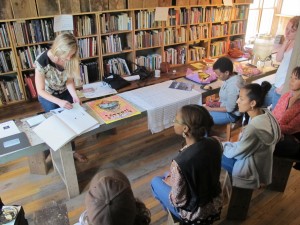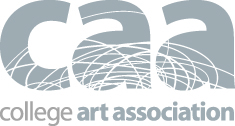I first met Jessica Cochran when I organizing a conversation series this past summer with Rebuild Foundation on non-traditional archives. Although she has been in my own backyard working at Columbia College Chicago, our paths had never crossed before then. It was through what always seems to be a circular grapevine of mentors and friends here in Chicago- Amy Mooney and Tempestt Hazel– I was introduced to her practice.
Jessica’s exhibition Social Paper, co-curated with Melissa Potter opens this evening along with tons of other exhibitions at Columbia. Jessica will be presenting during Friday’s panel From Paper to Practice: Tactics and Publics in Socially Engaged Art and is the organizer of a panel within The Feminist Art Project’s day long presentations on Saturday titled Motherhood and the Exhibitionary Platform: Considering the Implications of Maternity through the Curatorial Lens.
La Keisha Leek: Who is Jessica Cochran?
Jessica Cochran: I am a curator and arts administrator, and I am currently the curator and acting Assistant Director at the Center for Book and Paper Arts. Besides that I teach courses in contemporary art and arts administration at local colleges, and do various freelance projects that range from writing catalog essays to art collection management.
LL: Tell me about your curatorial practice?
JC: Through my curatorial work at CBPA I have developed an interest in interdisciplinary artist publications, paper and craft, and the role of text and activity of reading in relation to contemporary art. In my broader curatorial practice, I am really interest in generative projects—those that facilitate the production of new work—and creating opportunities to show Chicago-based artists in relation to artists from elsewhere. That doesn’t happen enough in this city, and its important that curators are constantly creating new contexts for artists.

Jessica Cochran presenting artist books from the Center for Book and Paper Arts and Dorchester Projects. Summer 2013.
LL: When did feminism enter the discourse for you and how has that continued to inform the ways in which you approach exhibition making and thinking about contemporary art?
JC: For me feminism runs pretty deep. I didn’t really grow up in a place where concepts of feminism were articulated with sophisticated language, however the importance of gender equity was constantly reinforced by my mother and father. As a child, I knew there was nothing I couldn’t do! Through college and into my career I have really developed in terms of my own approach to feminism—and I am both energized by the opportunities that exist for women today, but also a bit disappointed with the way that women are still fighting for equity in so many ways, while constantly dealing with a lot of problematic essentializing and stereotyping from the media and institutions. Today I am so fortunate to work with a group of individuals—women and men—who are committed to serious conversations about feminism in the workplace and in the arts in general—you wouldn’t believe the conversations I get to have on a daily basis with artists Miriam Schaer, Melissa Potter and April Sheridan.
Feminism enters my curatorial practice in several ways. First, I try my best to make sure that my exhibitions are diverse and expansive, and that whatever the topic they represent myriad ways of looking at and being in the world. The gallery is a place to be unmoored from your own subjectivity—gently and sometimes not so gently. Truly, I find myself working with so many women in exhibitions, Chicago has some of the smartest most interesting women creating just totally remarkable work.
LL: Having a curatorial practice that began outside of and continues to extends beyond your role at Columbia why do you feel it was important to work within arts education?
JS: I cannot even begin to articulate how incredible it is working in an academic gallery. The Center for Book and Paper Arts is embedded in an interdisciplinary arts department—meaning I get to work with and create programming for students and faculty interested in artists’ books, paper, media, performance, etc—and it is totally fantastic. The number one best part of my job is the relationships I build with students as they work by my side in the gallery and center. Through course opportunities in the gallery, student employment and their thesis exhibitions, I get to help students learn about the “white cube” from the point of view of an exhibition-maker and as an artist. From designing exhibitions to writing wall text to marketing, our students are part of it all. And of course, I learn as much from them as they do from me!
LL: What exhibition or program going on during CAA would you recommend to conference attendees?
JS: I have to promote Social Paper, an exhibition I co-curated with Melissa Potter. We look at hand papermaking in relation to socially engaged art. We have worked so hard on this how and want everyone to see it!
I first met Jessica Cochran when I organizing a conversation series this past summer with Rebuild Foundation on non-traditional archives. Although she has been in my own backyard working at Columbia …


